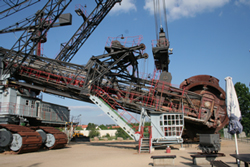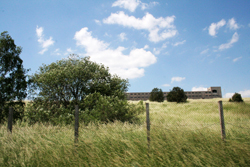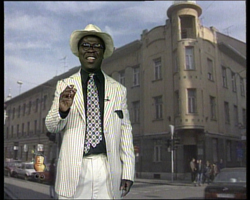“My daughter will learn Czech, right from the start, because we live a few metres from the border, because it is natural and logical, because to grow up bilingual represents a richness”. The experience of a life on the border between Germany, Poland and the Czech Republic: adopting bilingualism as an education policy and an antidote to prejudice and non-communication
To reach Ostriz from the north, a few hundred metres from both Poland and the Czech Republic, you pass through Kunnerwitz, Hagenwerded, Schönau-Berzdorf an der Eigen and other anonymous and apparently uninhabited villages, where the pretty houses in a rural German style, are mixed with a touch of more functional Socialist post-war aesthetics.

Here you find huge council housing ‘barracks’ in the open countryside. But not only that. You can come upon a disused nuclear power plant flanked by the ordered blades of a wind farm – a sign of changing times.
Further on, miles from anywhere, stands an inert monster as high as a ten-storey house, an industrial digger – that seems to belong in Fritz Lang’s film ‘Metropolis’ – that, during the happy days of the DDR, excavated coal from underground. Or perhaps encounter an old Volkswagen van passing slowly through the village. Equipped with loudspeakers, to a melancholy musical accompaniment, blares out propaganda for the German National Party (NPD) – none other than the neo-Nazi party.
This corner of Germany is surreal for one who has not grown up here. It is a poor corner, one of the poorest of the poor former East Germany, a victim of the end of the coal era, like other regions in Europe such as the regions of Charleroi and Mons-Borinage in Belgium. As sometimes happens, the decay in the economic and socio-cultural fabric, along with its proximity to the border have encouraged the development of nationalistic, often extremist and sometimes racist sentiments. With 40% unemployment and two borders, the party of extreme right, the German heir to the concentration camps, this is not a hard area to make converts. “Germany for the Germans!” caws the old-timer in the van to the apparently empty houses and Soviet-style blocks.
Landscapes change and borders do too, but the situation which one meets puts forward themes that are already familiar. Borders and national identity, a history of national and regional conflicts, World War II and cultural stereotypes; a history of misunderstandings and an ignorance of one another, together with a history of barriers such as language, the main agent in the construction and maintenance of identity, diversity and prejudice.
I went to speak about this with Dr. Gellrich, in the heart of Ostriz, in a graceful Samaritan nunnery, less than ten metres from the river that separates Germany and Poland. Her name is Regina and she grew up, studied and worked in this border region of eastern Saxony behind the Iron Curtain, when in school she learned Russian and only Russian. She was not taught Czech or Polish. Regina tells me she loves the Czech Republic. “Why?” I ask. Her answer is simple and spontaneous: “Because I went there on holiday with my parents there – it being the only one, or one of the few states where you could go abroad without a third degree grilling by an officer of STASI!” This insight comes from personal experience, it’s direct.
We are back in the ‘80s and Regina attends the school in Zittau, her town. In interactions with the Czechoslovakian neighbours, even just going to buy meat or get petrol, Regina feels uncomfortable, unable to speak a word of Czech. Yet everyone on the other side speaks German, at least a little, for business you understand. But that’s not the point, she says. Language is not just communication: “a kilo of meat, a tankful of petrol.” Language mediates and reflects stereotypes and prejudices that underlie an asymmetrical relationship: “It’s you (either Polish or Czechoslovakian) the poor neighbours (or worse)”, “you that you must learn German.” Hence the decision to attend an evening course in the Czech language learning with difficulty, but enough to allow, even knowing only a little, to “open a new world: people have begun to interact with me in a different way, to open doors, to be more friendly”, she says. One discovers the value of language as an instrument for interaction and cooperation.
Shortly before the fall of the Wall in 1988, Regina gave birth to Susanna and thinks: “my daughter will learn

Czech, right from the start, because we live a few metres from the border, because it is natural and logical, because to grow up bilingual represents a richness”. It introduces a second important element: diversity and bilingualism as richness. At this time Czech is not taught in the schools or kindergartens, and it is a problem to learn it. But the solution can be found nearby, a few kilometres away. This is Regina’s idea, to put Susanna in a Czechoslovakian kindergarten. She makes contacts, takes on the bureaucracy, clashes with the prejudices of those who blurt out a shocked “But WHY?” or those who tell her “you don’t want to send your little one to THEM, do you?”. Even the teachers are against it.
But obviously the twenty years of holidays that have gone before are stronger than the nay-sayers. Susanna ends up attending the nursery school across the borders at Hradek nad Nisou in Czechoslovakia where all three borders meet and close to her home in Zittau in Germany. The experience proves positive, and the little girl adapts quickly and is happy at the nursery. Thus was born the idea of a formal cooperation between the border regions, so that other children can repeat Susanna’s experience.
At that time Regina has just finished a doctorate in mathematics with a thesis on ‘Mathematical models of fluids dynamics’ at Kennewitz and returns to Zittau, where they had promised her a permanent position. The Berlin Wall falls, however and Germany reunites, and many things change. Amongst the changes is the structure of the University of Zittau: there is now no place for Dr. Gellrich. Regina finds herself with a temporary job and her child at a nursery school that they want to close. She successfully leads the Parents’ Association in the fight to keep it open. Enriched with this experience, she manages to get a job as administrator in a German non-governmental organisation called Children Care, which among its many projects, promotes cross-border cooperation. She is the contact with the authorities. Her daughter at that time is already attending the nursery across the border and Regina then decides to proceed with a model of cooperation based on her personal experience.
She moves from Children Care to Pontes, an agency that works to develop cross-border cooperation between the Czech Republic, Saxony and Poland in the field of education. It is interesting to note that the association – and the ideas – have arisen in a spontaneous, bottom-up fashion from the needs of individuals or small groups of individuals, a model that has subsequently found support and form in institutions and the Euroregion Neisse-Nisa-Nysa.
Regina’s idea is to develop a transnational network of education in the triangle between Germany, Poland and the Czech Republic, starting from a model based on her own experience. It was decided to start with the kindergartens. “On the one hand we want to offer people the opportunity to enroll their children in kindergartens across the border and on the other to ensure that in the German kindergartens in the region there are two teachers present, one a German native speaker, the other speaking Czech (or Polish)” she says. They are also producing books and games for bilingual kindergartens, helping to organise meetings and language courses for parents, children’s parties, holidays, and various other activities, where parents can get to meet ‘the other half’. The project has developed so rapidly that Regina’s second daughter, Juliane born in 1994, has been able to take advantage of new educational system.
Susanna is growing and about to start primary school, but there are no schools that can offer bilingual education. Thus was born then the idea of creating a more structured cooperation, not only limited to kindergartens but that would cover a child’s entire education. They therefore organise schools where Czech and German (or Polish and German) children can attend together, and where the teaching and the lessons take place in both languages and the educational programmes are developed through mutual agreement. Some schools are equipped with dormitories, where the children stay during the week, returning home to their families at the weekend. Juliane now attends one of these schools and I wanted to talk to her and to hear about her experience. Juliane is now a young girl and is full of enthusiasm for her magnificent school, her magnificent classmates, the magnificent Czech Republic and the wonderful language she is learning. Speaking with her you begin to realise that she is not simply learning a language other than her own, but is growing up in a multicultural environment, where she is learning to confront the differences. “Some of my friends who do not attend the ‘mixed’ school think that the Czechs are dangerous, bad, and a bunch of thieves; and the Czechs think that the Germans are closed and unable to come into contact with them. I don’t like prejudice and I know that it’s not like that.” Juliane is now almost perfectly bilingual and it seems quite natural to her to live or work in the Czech Republic, if life should ever offer her the chance. This is not just some little thing in a region where unemployment is among the highest in Germany and she and her schoolmates will enjoy better job opportunities as a result of their training, born of this long-lasting transnational cooperation of which Regina is one of the architects.
This highlights the last aspect of cooperation in the field of language and education, the socio-economic one. I ask Regina what she would like to achieve in the future, and of her dreams. “That this cultural cooperation project can sweep away cultural stereotypes that still imprison much of the population divided by the three borders”. For example there is a very interesting project involving the Universities of Zittau, Liberec and Wrozlaw. It seeks to allow young Germans in the region to choose to live and work in the Czech Republic – “So close and so similar in spirit to the former East Germany”, rather than in faraway – and foreign – West Germany. Dreams of an administrator of the NGO Pontes, but also those of a mother who lived on the other side of the Iron Curtain and who spent her holidays in Czechoslovakia. x
 Fabrizio Pizzioli is a researcher at the Fonds National de la Recherche Scientifique (FNRS) at the Catholic University of Leuven in Belgium. He has spent 8 years working on language and cognition. He is currently studying the neural basis of language in adults, the learning of language in children and diseases of language.
Fabrizio Pizzioli is a researcher at the Fonds National de la Recherche Scientifique (FNRS) at the Catholic University of Leuven in Belgium. He has spent 8 years working on language and cognition. He is currently studying the neural basis of language in adults, the learning of language in children and diseases of language.
He is also concerned with cross-linguistic differences and learning in bilingual children.
